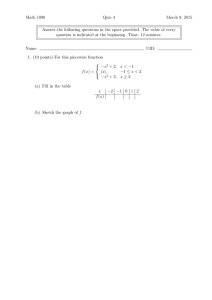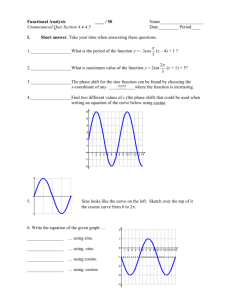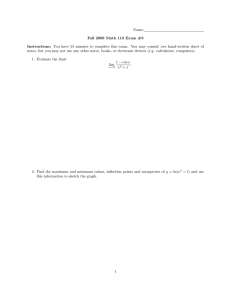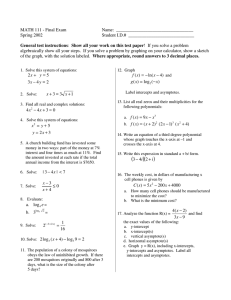Review Problem Set
advertisement
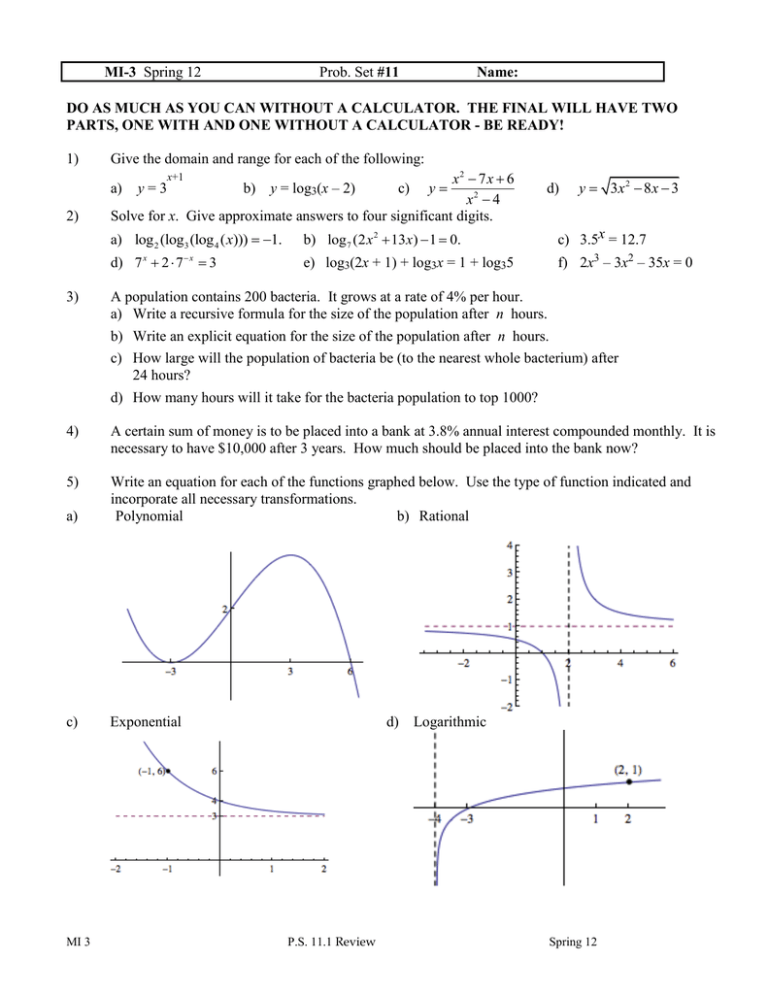
MI-3 Spring 12 Prob. Set #11 Name: DO AS MUCH AS YOU CAN WITHOUT A CALCULATOR. THE FINAL WILL HAVE TWO PARTS, ONE WITH AND ONE WITHOUT A CALCULATOR - BE READY! 1) Give the domain and range for each of the following: x2 7 x 6 x2 4 Solve for x. Give approximate answers to four significant digits. a) 2) 3) x+1 y=3 b) y = log3(x – 2) c) y d) y 3x 2 8 x 3 a) log 2 (log3 (log 4 ( x))) 1. b) log 7 (2 x 2 13x) 1 0. c) 3.5x = 12.7 d) 7 x 2 7 x 3 e) log3(2x + 1) + log3x = 1 + log35 f) 2x3 – 3x2 – 35x = 0 A population contains 200 bacteria. It grows at a rate of 4% per hour. a) Write a recursive formula for the size of the population after n hours. b) Write an explicit equation for the size of the population after n hours. c) How large will the population of bacteria be (to the nearest whole bacterium) after 24 hours? d) How many hours will it take for the bacteria population to top 1000? 4) A certain sum of money is to be placed into a bank at 3.8% annual interest compounded monthly. It is necessary to have $10,000 after 3 years. How much should be placed into the bank now? 5) a) Write an equation for each of the functions graphed below. Use the type of function indicated and incorporate all necessary transformations. aPolynomial b) Rational c) Exponential MI 3 d) Logarithmic P.S. 11.1 Review Spring 12 6) The graph of y = ƒ(x) is shown. Sketch each of the following. Label all asymptotes and at least 4 points on part (a) and at least 3 points on part (b). a) y | f ( x) | b) y 1 f ( x) (see last page for copies of this graph to draw on) 7) Find the sum and the product of the roots of P(x) = x25 + 16x24 + x23 – x10 + x – 53. 8) Derive a quadratic function whose maximum value is 5 when x is –3, and contains the point (–6, 0). 9) a) Sketch the graph of h(x) = 3x 2 11x 4 . x2 2 x 8 b) Give the coordinates of all zeros. c) Give the equations of all asymptotes. d) Describe and give the coordinates/equations of any other interesting features. 10) Solve for all complex numbers, z, (in the exact form a + bi ). a. (2 – 3i) z – 4 + 2i = 1 – 3i b. z = (4 – 3i)(2 + 5i) – (6 + 4i) 11) Find the equation of a fifth degree polynomial with integer coefficients, leading coefficient of 1, and roots of x 3, 3, and 1 i . 12) Derive the equation of a sine function whose graph has a maximum value of 3, minimum value of k ,0 . –3, and zeroes at 3 3 13) a) MI 3 x 3 2t Sketch the graph of: . Label 3 points. y 5 3t b) Rewrite y as a function of x. That is, eliminate the parameter t. P.S. 11.2 Review Spring 12 14) 15) Find the value of: a) cos b) sin c) cot d) cos 2 e) tan( ) 3 f) csc 2 g) Give the approximate measure of to the nearest tenth of a degree. Let f ( x) 4 3 sin 2 x . Find: 2 amplitude vert. shift phase shift maximum point ( 16) 17) 18) MI 3 ) ( , Solve for x in the given domain: 2 4 cos(3x) 0, x . a) b) 5 tan x 7 tan x 2, x . c) 2 cos2 x 5sin x 4 0, x [ , 5 ]. 2 2 Find the inverse of each function: 3x 1 a. f(x) = b. g(x) = log3(x – 5) + 2 x2 c. h(x) = 4·3x – 5 + 1 Solve for x. Give exact answers in part (a), and round to thousandths in part (b). a) 19) , minimum point 9 x 5 1 27 x b) 4.732 x 12.521 Give the quotient and remainder when 4 x 4 7 x3 6 x 21 is divided by x 2 . P.S. 11.3 Review Spring 12 ) 20) Consider the graph below. a. What is the period of this function? b. What is the amplitude of this function? c. Where does this function first cross the negative x-axis? d. Considered as a cosine function, what is the phase-shift of this function? (Note: there are many possible anwers. Choose the least positive value.) e. Write an equation for this function as a cosine graph. f. Considered as a sine function, what is the phase-shift of this function? (Note: there are many possible answers. Choose the least positive value.) g. Write an equation for this function as a sine graph. h. What are all the zeroes of this function? 21) Consider the graph below of a tangent function. a. What is the period of this function? b. Where are the asymptotes of this function? c. If , 3 is a point on this graph, write an equation for this tangent function. 3 d. Now write an equation for the graph considered as a cotangent function. MI 3 P.S. 11.4 Review Spring 12 22) Let a be a number in the interval [1,1]. Do the equations sin x a and x arcsin( a) have the same solution set? Explain. 23) What angle does the equation 3 x 2 y 7 0 make with the positive x-axis? 24) Write the equation in slope-intercept form of a line which makes an angle of 30° with the positive xaxis and which passes through the point ( 12, 42) . REVIEW YOUR MI 3 NOTEBOOKS! MI 3 P.S. 11.5 Review Spring 12

